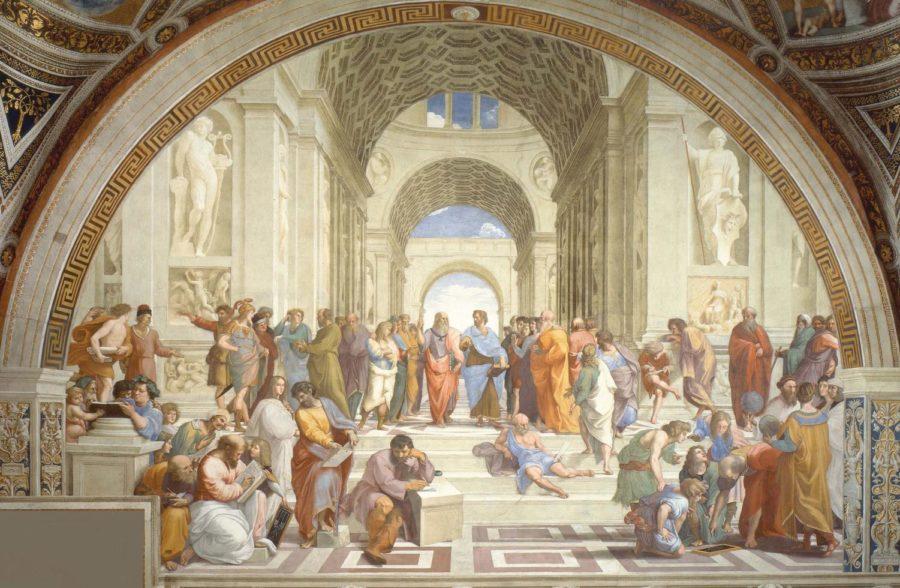Snell: You don’t know what you don’t know
Photo courtesy of Wikimedia Commons
Raphael School of Athens
December 7, 2011
Last week I wrote an article regarding the need for a classical liberal education as part of a citizen’s duty to most effectively participate in their governance. I asserted that education has transitioned away from classical liberal principles and toward the vocational. I cited Iowa State’s focus on engineering as an example of vocational schooling and condemned the focus on one subject as being detrimental to citizenship.
For this, I received some criticism.
My detractors, all engineering majors, missed the point and typically chose to lord their chosen profession over mine in their responses. One respondent even went so far as to assert that he, an engineer, was wiser and more experienced than me, a measly little history major.
I went to Iowa State in the 1990s for electrical engineering, and I worked for a time for the Department of Energy doing research in high-performance networking and scalable computing. After that, I worked for the U.S. Army and two sheriff’s departments.
So I understand education from an engineering perspective. My critics need to understand that disparaging vocational education in universities is not disparaging engineering. I never said science was bad. In fact, science was the most politically revolutionary thing to happen to the human race since the Roman Republic.
Science allows you to find out about the world and, most importantly, it lets me find out about the world too and verify your results, leading to the establishment of facts. In this “we do it together” sense, science is extremely political. What my engineering pundits failed to grasp is the principle that engineering — and all branches of science — is as much a part of a liberal education as history or philosophy.
It was claimed by one critic that various percentages of kids did not attend high school at times in the past, and that more kids graduate high school today than ever before. This was given as a reason why an old-style liberal education was nonsense. However, a liberally educated person would have realized that the 45 percent of kids who didn’t attend school in 1840 have no bearing whatsoever on the merits of liberal curricula.
Furthermore, the premise that higher graduation rates prove the success of the current education system is patently false. Many studies show the “dumbing down” of tests and primary school programs, which has produced under-educated and woefully ignorant graduates. Frankly, we have higher graduation rates because we let more idiots through.
It was also said that with Iowa State’s current curricula, there is no way to fit more classes in to be more broadly educated. That misses the point too. The idea isn’t to teach you according to classical liberal tradition in four years, but over the course of your upbringing to adulthood. From kindergarten to a bachelor’s, you’ve got 17 years to be educated properly.
Naturally you can’t learn everything. Though a person educated in the classical liberal sense will understand enough math and physics, for example, to be able to read an engineering textbook with some degree of understanding, and what they don’t get they can figure out. People who aren’t trained specifically to be engineers can’t do that these days, and that’s the fundamental problem.
One of my critics suggested that majoring in history was a dead end, saying that you can’t do anything with that degree. I can see why someone criticizing liberal education would criticize history, as it’s a large part of a liberal education. However, just like a liberal education is multi-faceted and has many inter-weaving parts. History is not the destination, but one of many things along the way. History majors usually go on to do important things like become lawyers, teachers, journalists or CIA agents.
The argument was also made that most members of Congress have degrees in “stupid” things like history, and this is the real reason behind our floundering government. The 112th Congress has 24 doctors, five preachers, eight cops, six engineers, a physicist, a chemist, a microbiologist and an astronaut, and most of them are Catholic. So I guess God, science and the fuzz are partly to blame too, beyond all those dumb history majors.
It’s true that most of our elected officials probably aren’t educated properly to represent and govern. But the problem isn’t that they were history or engineering majors, but rather that one discipline knows nothing about the other or anything else, as our representatives, like all of you, received a vocational education instead of a liberal one.
Studies show that employers don’t want people who know everything about their profession. What they want are people who have good reading, communication and reasoning skills, self-motivation, the ability to do varied tasks and so on. The same studies report that graduates are grossly inadequate on these points.
Subject knowledge, the studies also show, ranks down toward the bottom of the priority list. Employers aren’t looking for vocationally educated graduates, they’re desperate and begging for graduates with the qualities produced by a liberal education. Employers can teach employees the engineering, but employees need to know how to read and write well, and know about the world first.
Knowledge is power indeed, but don’t presume that your vocational education makes you knowledgeable because you’re probably not as smart as you think. I love Iowa State and there’s nowhere I’d rather be, but if this school still had entrance exams most people here probably would be flipping burgers instead right now.
You don’t know what you don’t know, and there’s no justification for being ignorant when there’s an alternative.
Demand better.







